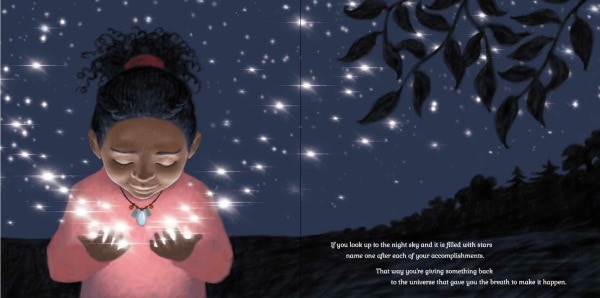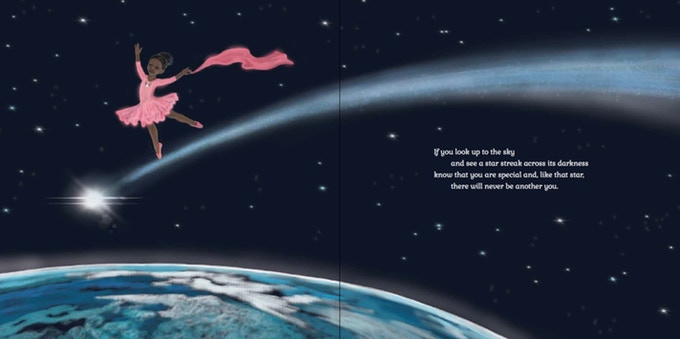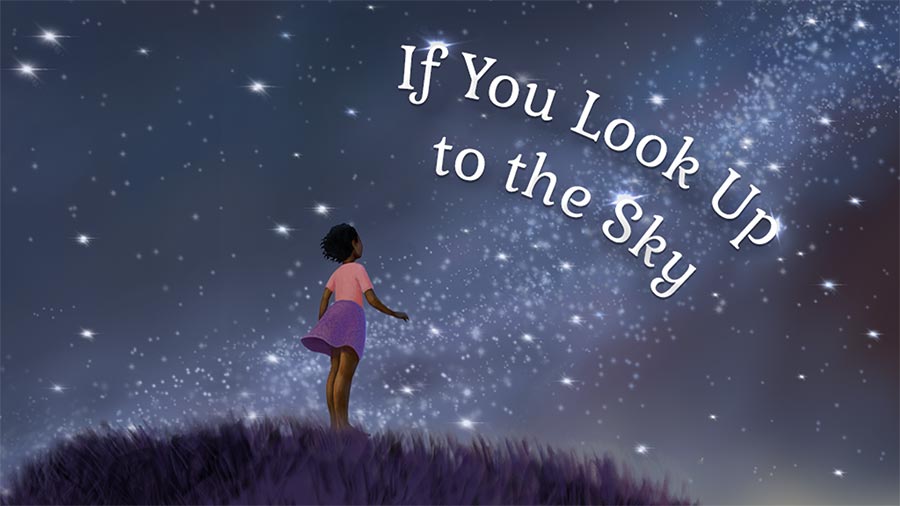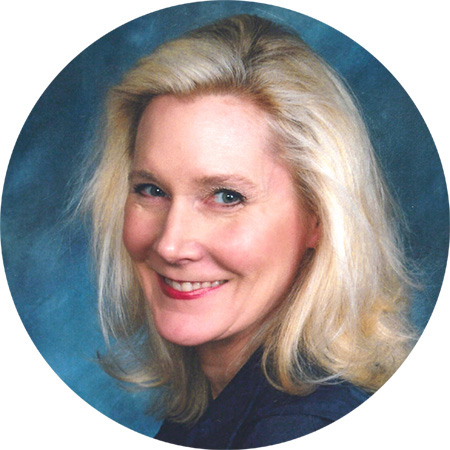Every once and while a book—and its author—come into your world and make an indelible mark. Such is the case with first-time author Angela Dalton and her exquisite picture book If You Look Up to the Sky.
Inspired by Dalton’s own life and experiences, the story is about a young black girl whose grandmother teaches her that the sky and universe will always offer her love, protection, and guidance should she ever need it.
The words are words that every child deserves to hear:
and see a star streak across the darkness
know that you are special and, like the star
there will never be another you.”

Author Angela Dalton
But Dalton’s voice is intended for the young girls of color—to lift them up and remind them of their singular beauty in the face of challenge, discrimination, and hardship.
The right book in the right child’s hand has the power to transform that child forever. I imagine, in time, If You Look Up to the Sky by Angela Dalton will transform thousands, if not millions of children’s lives. This is a book for all to love, but it is especially a book for girls of color to love.
I think Angela’s pretty special. And I know she’s got a lot more to share with us in the months and years ahead. I had the opportunity to interview her recently. Our conversation follows.
You can purchase If You Look Up to the Sky online and at bookstores across the nation.
An Interview with Angela Dalton
It’s demoralizing to learn that one word can hold that much power over you; however, as you grow, you become stronger and more resistant to it. In my own experience, it forced me to find my own voice and strength against it—and that has served me well in my adult life.
The first thing I ask people of non-color to do is shelve any emotions of fear or guilt. I think it’s important to understand that acknowledging the history that people of color have with this country is the first step to having honest conversations and making progress. If you’re not willing to do this because it makes you feel uncomfortable, you’re not willing to put in the work to change anything.
Exposing yourself to other voices—whether it’s through books or other forms of media – is equally as important. Everyone has a tendency to insulate themselves in the familiar to validate their own personal representation. However, this makes it too easy to discount those who are marginalized because their voice or struggle doesn’t fit within your own paradigm.

Illustrations by Margarita Sikorskaia.
When I was growing up, there was always this tendency to equate the “black experience” with an “Inner-city experience.” My childhood experiences spanned everything from the city to Bible Belt country to upper-class neighborhoods of white America. With If You Look Up to the Sky, it was important to show representation not just with skin color but place in the world. People of color live and make contributions everywhere. I want girls to see themselves in places that they either can identify with or inspire them to see themselves in.
There’s a big world out there, and I want them to know they deserve a place in it.
You’re also taking on the massive responsibility of potentially putting certain ideas or perpetuating stereotypes in the world without knowing you’re doing so. No matter how sincere our intentions or skilled at the craft we may be, there are just some stories that aren’t ours to tell.
At the very least, I would hope that if a writer or creator decides to take on a story that’s not their own they’ll collaborate with or seek guidance from someone in the culture or community they are writing about. By doing so, you can answer the most important question: Should I really be telling this story?
Two that come to mind:
Liza Lou and the Yeller Belly Swamp by Mercer Mayer was the first book I remember reading that featured a strong, smart black girl as the protagonist.
Goodnight Moon by Margaret Wise Brown is a book I remember reading that always left me feeling safe.
Throughout most of the book, you’ll see that the main character is alone. This was intentional. I wanted the reader to understand that there’s an undeniable strength and power being able to stand alone and you will be forced to do it many times throughout your life. That’s one of many things I would tell my younger self.
It’s easy to compartmentalize someone based on their title or role, and it leaves little room for effective collaboration. Going into this, I knew I had to keep myself open to other people’s feedback or interpretation. I didn’t always agree or move forward with it—but there were some great ideas I would have missed.
I chose self-publishing for a few reasons.
This story was extremely personal. I know myself, and because I had an unshakable intent for why I wrote it, I knew I couldn’t release it completely for someone else’s creative interpretation. There’s too much of myself invested in it.
I wanted to prove to myself that I could do it—and learn the process of publishing along the way. Understanding how and why something works has always motivated me, even in my corporate career. I’m happier rolling up my sleeves and getting deep into the mix of things.
It would be remiss of me if I left out that I didn’t accomplish publishing this alone. I couldn’t have asked for a more brilliant and supportive editor than Lily Coyle at Beaver’s Pond Press in Minneapolis, MN. She knew when to listen, when to gently push, and when to tell me I was just wrong. She and her team were also great teachers and mentors, and always willing to share their knowledge of publishing with me.
Now that I’ve had this experience, I’m excited to try the traditional publishing route. Not only do I still have more to learn, but I have valuable experience that I can bring to the table. I also have many, many more stories to share!
Ironically, Margarita and I had actually met 15 years prior at a mutual friend’s party, so it felt a little like kismet to be working with each other.
People have asked if I sought out an illustrator of color to work on the book, which I did during my search. It didn’t work out for many reasons. In hindsight, I believe everything happened as it was supposed to, and I feel fortunate that Margarita wanted to work together.
Because of our racial and cultural differences, and trust with each other, we had many conversations about culture and race that I don’t think would have happened in a different situation. An example of this, was a discussion we had about the opening illustration of the girl sitting on her grandmother’s lap on the front porch. Margarita’s questions as an artist allowed for us to talk about the importance of the front porch in the black community—it’s where and how the community has traditionally come together.
I learned a lot about Margarita growing up in Russia and her life in America, which was fascinating to me. I love hearing about other people’s life experiences. At the end of it all, Margarita isn’t just the illustrator who worked on my book, she also became a great friend.

I’m working on not worrying about what other people think of me, which is hard to do with social media and all the trolls out there. It seems as though everyone is facing this challenge these days.
I will continue writing and publishing children’s books. I have a few first drafts waiting for attention. I also have an idea that I’ve been working on that may be better told as a YA novel. That will be a new and welcomed writing challenge.
One question I would like to pose: Is diversifying children’s literature solely for the benefit of children of color or does it benefit all children?
It seems that when there are discussions about diversity and inclusivity, certain people automatically interpret this to mean replacing something; that somehow someone has to lose in order for someone else to win. This just isn’t the case. There’s room for everyone.
Exposing all children to diverse stories and characters allows them to see the world for what it is and what it could be. It helps them recognize similarities and value differences. It’s important and it’s everyone’s responsibility to make this possible.
Thanks for sharing your story with us, Angela!



 Kristen Heimerl
Kristen Heimerl 